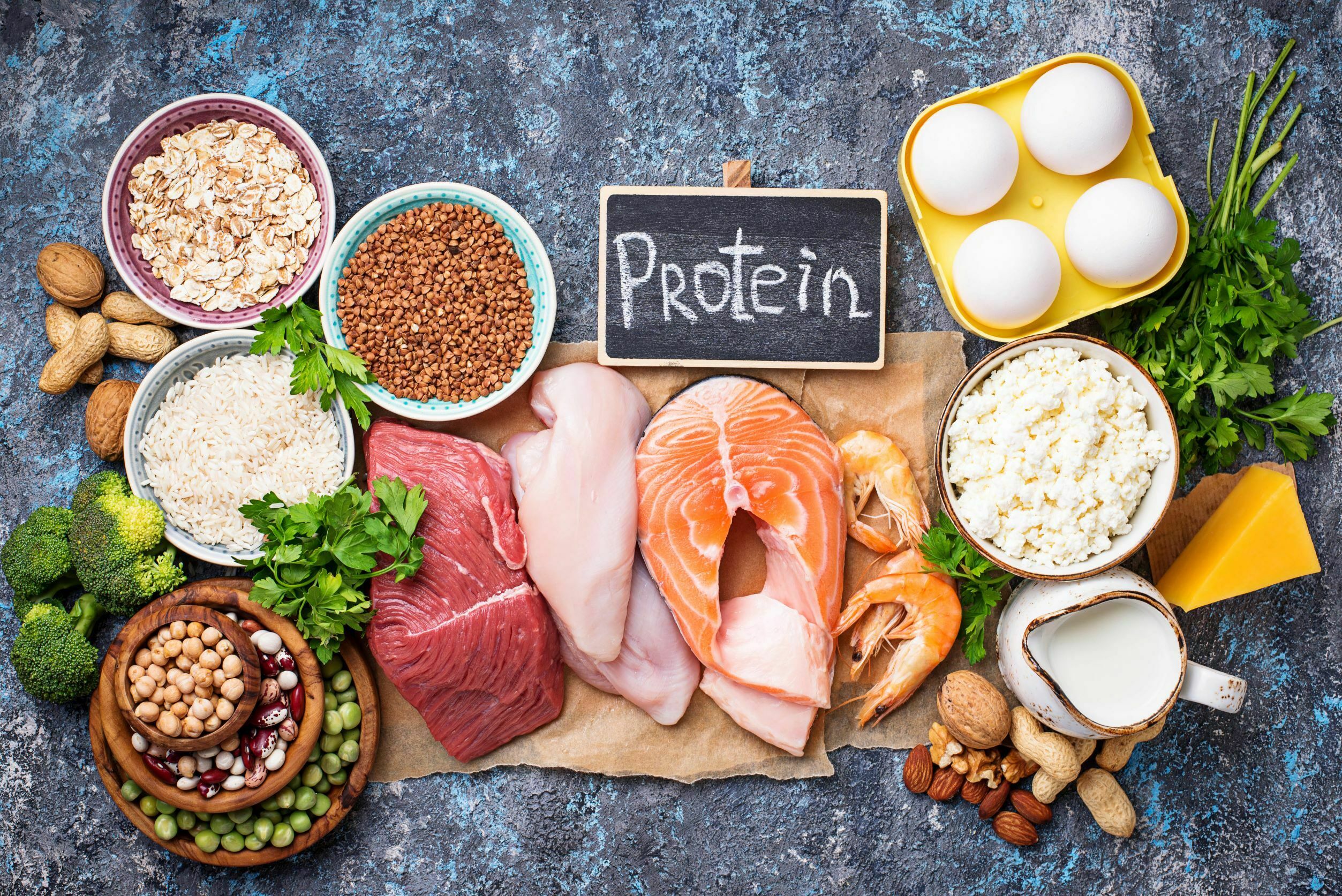Carbohydrates tend to take the main stage in discussions about diabetes and meal planning. Protein, on the other hand, plays an important role in your health and well-being. Protein is the building block of your organs, muscles, nervous system, blood vessels, and skeleton. We’re here to explain everything: what protein is, why it’s important, how much you should eat every day, protein and glucose, the best protein sources, and what science says about people with diabetes.
What is protein?
Protein can be found in muscle, bone, skin, hair, and virtually every other body part or tissue. It is the building block of enzymes, which power many chemical reactions, as well as hemoglobin, which transports oxygen in your blood. At least 10,000 different proteins contribute to your uniqueness and keep you that way.
Protein is composed of over twenty basic building blocks known as amino acids. Because we cannot store amino acids, our bodies produce them in two ways: from scratch or by modifying others. The essential amino acids, which include histidine, isoleucine, leucine, lysine, methionine, phenylalanine, threonine, tryptophan, and valine, must be obtained from food.[1]
As for the protein you eat, it is classified intro two: complete or incomplete protein. Complete proteins can be found in eggs, meat, fish, poultry, cheese, and milk. All of the essential amino acids are found in them. The majority of plant proteins, such as those found in nuts, seeds, beans, and grains, are incomplete. They don’t contain all of the necessary amino acids. The exception is soy protein, which is a plant protein that contains all nine necessary amino acids. If you’re a vegetarian, you should eat a variety of proteins every day to ensure you get all of the amino acids your body requires.
Protein, like glucose, gives the body energy; each gram of protein contains four calories. However, protein is not the body’s primary source of energy. Protein is largely used by the body to repair body tissue.
How much protein do you need?
Adults should consume a minimum of 0.8 grams of protein per every kilogram of body weight every day, or just over 7 grams for every 20 pounds of body weight, according to the National Academy of Medicine.[1]
- This equates to around 50 grams of protein per day for a 140-pound person.
- This equates to around 70 grams of protein per day for a 200-pound person.
The National Academy of Medicine also establishes a wide range of recommended protein intake, ranging from 10% to 35% of daily calories. Aside from that, there isn’t much solid data on the appropriate quantity of protein to include in one’s diet or the healthiest calorie target for protein. The percentage of calories from total protein intake was not associated to overall mortality or particular causes of death in a Harvard study of nearly 130,000 men and women who were followed for up to 32 years.[2] The source of protein, on the other hand, was essential.
What is the connection between protein and blood glucose?
Protein can be broken down by the body into glucose and utilized for energy in addition to helping the body grow (a process known as gluconeogenesis).
Protein may be converted down into glucose by the body, and the results are more noticeable if you eat less carbohydrate-rich meals.
Protein is less efficiently broken down into glucose than carbohydrate, therefore any effects of protein on blood glucose levels occur anywhere from a few hours to several hours after eating.
When eating a predominantly protein-based meal, people with type 1 diabetes or type 2 diabetes on insulin should keep the effects of protein in mind. It’s crucial to figure out how your blood sugar reacts to certain foods so you can figure out how much insulin you’ll need.[3]
Can protein be bad for people with diabetes?
When it comes to selecting proteins for a diabetic diet, the fats and carbohydrates that these meals contain are more of a worry.
Some carbs, for example, are quickly converted to glucose, causing an increase in blood sugar. Furthermore, the danger of weight gain from high-fat and high-carb diets might result in blood sugar levels that are difficult to control.
The American Diabetes Association suggests eating fish at least twice a week as a protein source. They also advise minimizing red meat and processed meats such as ham, bacon, and hot dogs, which are high in saturated fats. For a well-balanced diet, lean meats are the superior option.[4]
An excessive amount of protein in the diet, especially when combined with alcohol, can contribute to gout.[5]
Although red meat has been related to health issues, the danger is not so large that people should avoid it entirely. It is, however, recommended that you seek out high-quality, fresh red meat rather than processed meat.
What about protein powders?
Powdered protein can be derived from a variety of sources, including eggs, milk (casein and whey), and plants (e.g., soybeans, peas, hemp). Some protein powders contain protein derived from a variety of sources; for example, a vegan option may include protein derived from peas, pumpkin seeds, sunflower seeds, and alfalfa. Protein powders, like other dietary supplements, are not regulated for safety by the US Food and Drug Administration. Non-protein ingredients such as vitamins and minerals, thickeners, added sugars, non-caloric sweeteners, and artificial flavoring are common. If you decide to consume protein powder, it is essential to read the nutrition and ingredient labels first and to consult your doctor or nutritionist, as some products may contain unexpected ingredients as well as large amounts of added sugars and calories.
Takeaway
It is advisable to discuss your protein requirements with your doctor. You can also talk to a certified diabetes educator, as well as a dietitian or nutritionist who specializes in nutrition plan for diabetes.
References:
- Protein | The Nutrition Source | Harvard T.H. Chan School of Public Health. (2012, September 18). The Nutrition Source. https://www.hsph.harvard.edu/nutritionsource/what-should-you-eat/protein/.
- Song, M., Fung, T. T., Hu, F. B., Willett, W. C., Longo, V. D., Chan, A. T., & Giovannucci, E. L. (2016, November 1). Association Of Protein Intake with Mortality. Association of Animal and Plant Protein Intake with All-Cause and Cause-Specific Mortality | Cardiology | JAMA Internal Medicine | JAMA Network. https://jamanetwork.com/journals/jamainternalmedicine/fullarticle/2540540.
- (2019, January 15). Protein Is One Of the Three Main Energy Providing Macronutrients, Along with Carbohydrate and Fat. Protein Helps the Body to Grow New Tissue, Therefore Helping to Build Muscle And Repair Damage To the Body. Diabetes. https://www.diabetes.co.uk/nutrition/protein-and-diabetes.html.
- Protein | ADA. (n.d.). Protein | ADA. https://www.diabetes.org/healthy-living/recipes-nutrition/eating-well/protein.
- (2019, January 15). There Is No Need for People with Diabetes to Give Up Alcohol Simply Because Of Their Diabetes. Although Alcohol Does Have an Effect on Blood Sugar Levels, With a Few Precautions And Careful Management, People With Diabetes Can Also Enjoy a Drink. Diabetes. https://www.diabetes.co.uk/diabetes-and-alcohol.html.








